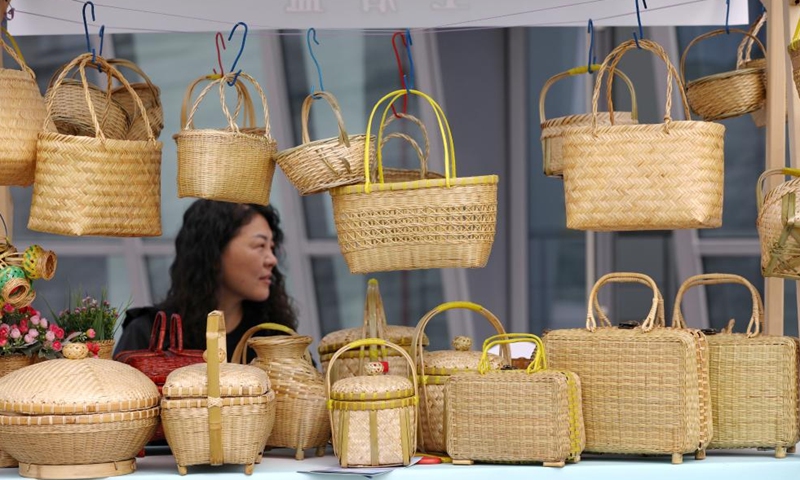
A woman displays her bamboo weaving wares at a market in Jiaxing, east China's Zhejiang Province, June 11, 2022.Photo:Xinhua
Women's education in East China's Zhejiang Province has improved significantly in the past decade, with the proportion of young women receiving higher education surpassing that of men, according to the fourth survey on the social status of Chinese women released by the Women's Federation of Zhejiang on Wednesday.
The survey shows that women’s consciousness of rule of law and gender equality has increased, and 58.9 percent of respondents disagreed that “men should focus on society while women should focus on the family,” 85.7 percent disagreed with the statement “it is only the mother's responsibility to take care of children,” and nearly 70 percent disagreed that “wives should obey their husbands at home.”
The fourth survey on the social status of women in Zhejiang was organized by the provincial Women's Federation and the provincial bureau of statistics as part of the fourth survey on the social status of Chinese women, The Paper reported. Samples were collected from 3,300 households in 44 counties and 11 districts in the province.
According to the survey, female workers aged between 18 and 64 account for 41.9 percent of the employed in Zhejiang. Two thirds of women in the province are employed and the proportion of women in employment is relatively balanced between urban and rural areas.
Women also take on more family responsibilities while at work. On average, working women spend 629 minutes being busy in total on weekdays, of which 508 minutes are paid; Housework such as caring for family members and cooking, cleaning, and daily shopping accounts for 120 minutes.
In terms of education, women aged 18 to 64 in Zhejiang have 8.95 years of school education on average, including 9.49 years for urban women and 7.56 years for rural women. The gap between urban and rural areas has narrowed from 3.9 in 2010 to 1.9 years.
About 80 percent of the respondents knew about the Law on the Protection of Women's Rights and Interests, the Anti-Domestic Violence Law, the Marriage Law and the Inheritance Law. Among all the respondents, 94.3 percent agreed that “women are no less capable than men” and 96.4 percent agreed that “it is important for women to have a gainful job.” In addition, 95 percent of respondents believe that “men should balance family and work.”
According to the survey, the proportion of husbands and wives sharing housework has increased in the past decade, with 56.4 percent of families in which women are still taking on more family chores and obligations and 35.9 percent of couples sharing housework, which means these percentiles have gone down 12.3 percent and up 11.6 percent respectively from 2010. More than 70 percent of women are satisfied with their married life and the relationships between husband and wife are generally perceived as harmonious and equal.
Global Times




